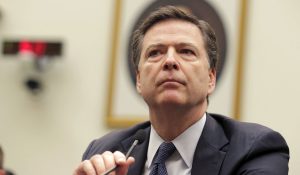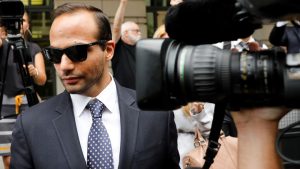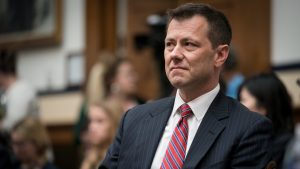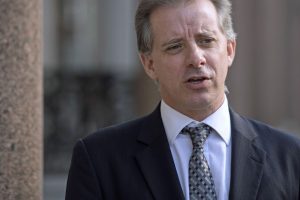Recently, the FBI released the FD-302 (Report of Interview) of Joseph Mifsud, who you recall was an academic alleged to have told Trump campaign staffer George Papadopoulos he knew about “dirt” the Russians had on Hillary Clinton relating to emails. The Mifsud 302 appears within hundreds of pages of previously unseen records from the Mueller investigation obtained by Buzzfeed in a Freedom of Information Act lawsuit.
 Let’s back up for context and remember the Mueller Report described Mifsud as an individual “in contact with Russians” although then-FBI Director Comey would go on to describe him as a “Russian agent”. That claim doesn't appear documented anywhere else. Papadopoulos and Mifsud met at an academic conference in Rome in early March 2016 and again at least twice in London after that. It is at the meeting on April 2nd that Mifsud supposedly told Papadopoulos about the “dirt” on Clinton.
Let’s back up for context and remember the Mueller Report described Mifsud as an individual “in contact with Russians” although then-FBI Director Comey would go on to describe him as a “Russian agent”. That claim doesn't appear documented anywhere else. Papadopoulos and Mifsud met at an academic conference in Rome in early March 2016 and again at least twice in London after that. It is at the meeting on April 2nd that Mifsud supposedly told Papadopoulos about the “dirt” on Clinton.
Again, according to the Mueller Report, Papadopoulos would go on to repeat this information to a “Friendly Foreign Government” (Diplomat Alexander Downer of Australia), who in turn told the U.S. Embassy in London and the FBI, thereby launching the investigation into Russian interference in the 2016 election code-named Crossfire Hurricane (CH) on July 31st.
to a “Friendly Foreign Government” (Diplomat Alexander Downer of Australia), who in turn told the U.S. Embassy in London and the FBI, thereby launching the investigation into Russian interference in the 2016 election code-named Crossfire Hurricane (CH) on July 31st.
Before we look critically at the Mifsud 302, consider that nearly everything we know from above is footnoted in the Mueller Report as coming from Papadopoulos himself, or the charging document against Papadopoulos, which is basically the same thing. There are no references to the Mifsud 302 in the Mueller Report, even though he was interviewed by the FBI three months before Mueller was appointed.
This is interesting because there are four references to news articles as footnotes about Mifsud and/or Papadopoulos in the section titled “George Papadopoulos” which would seem to be less important than the interview of the man himself; a man who is believed to be at the very genesis of the CH investigation. In fact, in his new book Compromised, FBI Deputy Assistant  Director Peter Strzok, who led the CH investigation, describes on page 90 how the hunt was on for months to identify who it was that supposedly told Papadopoulos that the Russians had dirt on Hillary Clinton.
Director Peter Strzok, who led the CH investigation, describes on page 90 how the hunt was on for months to identify who it was that supposedly told Papadopoulos that the Russians had dirt on Hillary Clinton.
The first thing to note about the Mifsud 302 is how short and bereft of details it is. In fact, it is so brief, given the significance of the investigation, it is either purposely evasive or the worst written FD-302 in the history of the FBI. From a timeline perspective, this interview was in February of 2017, approximately a month after the FBI first interviewed Papadopoulos, which is how Strzok’s mystery man was identified. (We think.)
Remember, the FBI had been investigating Papadopoulos as part of the larger CH investigation for six months before interviewing him. Theories abound about why it took so long to interview him, but a good one is that a lot of energy was being devoted to the Steele Dossier, the Carter Page FISA warrant, and General Michael Flynn, even though it was supposedly the Papadopoulos information that started the investigation.
The next problem is that the interviewing agents allowed Mifsud to tell them he first met Papadopoulos in Rome “approximately 8 months ago.” First, the FBI should have known from talking to Papadopoulos this was wrong by at least three months. They had met almost a year earlier, in March. Giving the interviewing agents the benefit of the doubt that they did not know this, no agent should let an important witness define a time-frame so loosely.
They should have asked him to pin down a tighter time-frame, or they should have written at length that despite their efforts to pin down a more definitive time, he could not. The mistake is compounded two sentences later when the interviewing agents advised that Mifsud told them he next met Papadopoulos “approximately two months later” in London. It was actually more like two weeks later, but again, the agents should have pushed for more definitive time-frames.
 The next major mistake comes when Mifsud describes who else was at the second meeting, which in this case is an individual named Olga Polenskaya. She is an interesting and still mysterious character in the larger CH investigation, and Mueller mentions her cryptically only 6 times. She is the individual Papadopoulos claims was first introduced to her as “Putin’s niece,” (which has been widely reported in the media,) although that was later determined not to be true. The agents write with zero context, (I just told you more than they wrote,) “Mifsud did not believe Polenskaya was related to Vladimir Putin….”
The next major mistake comes when Mifsud describes who else was at the second meeting, which in this case is an individual named Olga Polenskaya. She is an interesting and still mysterious character in the larger CH investigation, and Mueller mentions her cryptically only 6 times. She is the individual Papadopoulos claims was first introduced to her as “Putin’s niece,” (which has been widely reported in the media,) although that was later determined not to be true. The agents write with zero context, (I just told you more than they wrote,) “Mifsud did not believe Polenskaya was related to Vladimir Putin….”
There is a multi-session course at the FBI Academy called Field Office Administration and Communications, or FOAC. It is where every agent is taught to write Bureau-style. Rule number one is that every FD-302 must stand on its own; the uninformed reader must be able to discern what the writer is conveying in context from every individual 302. The stand-alone statement that “Mifsud did not believe Polenskaya was related to Vladimir Putin”, in perhaps the most important investigation in the FBI’s history, is a Perry Mason-worthy moment. It demands an introduction, the context the statement was made in, several follow up questions for detail, and a conclusion. None of that is included here.
The next, and perhaps most important, two-sentence paragraph that goes unchallenged is Mifsud’s denial about having any advanced knowledge of Russia being in possession of emails from the Democratic National Committee, and that Papadopoulos must have mistaken their overall discussion about cybersecurity for a more detailed one about Clinton. This is, after all, at the very heart of the CH investigation. Either Papadopoulos and Downer are lying about this, or Mifsud is lying – both can’t be true. The agents had to have previously had, at minimum, some amount of information about the important details of the CH investigation going into this interview to challenge Mifsud, and they should not have let him off the hook with a short denial like this. Why they did so is a significant mystery.
Lastly, Mifsud inaccurately claimed there were no other meetings between him and Papadopoulos when in fact there were two more. The Mueller Report notes this inaccuracy as “false” while it merely notes he “denied” the more important statement above about the stolen emails. Again, there was no follow-up by the interviewing agents on this point either.
 When the primary sub source of Christopher Steele’s infamous dossier, Igor Danchenko, was identified, the FBI devoted 57 pages to summarizing his interview in an Electronic Communication (EC). An EC is an internal document whose primary purpose is relay information, not to record testimonial statements – that is what a 302 is for. The EC was also authored by an intelligence analyst, not a special agent which is an indication the FBI never intended for Danchenko’s statement to be used as evidence.
When the primary sub source of Christopher Steele’s infamous dossier, Igor Danchenko, was identified, the FBI devoted 57 pages to summarizing his interview in an Electronic Communication (EC). An EC is an internal document whose primary purpose is relay information, not to record testimonial statements – that is what a 302 is for. The EC was also authored by an intelligence analyst, not a special agent which is an indication the FBI never intended for Danchenko’s statement to be used as evidence.
Mifsud’s statement on the other hand was recorded on a one-and-a-half-page FD-302 by special agents which make it a testimonial document in FBI parlance; two of the seven paragraphs were pro forma language contained in almost every FBI 302. Arguably, the interview of Joseph Mifsud was exponentially more significant than that of Danchenko toward understanding how CH was started, and yet at best, it was glossed over. After the interview, Mifsud went into hiding which apparently made it impossible for the FBI to re-interview him, even though they went on to collect texts and emails between him and Papadopoulos.
The Mueller Report claims that both Papadopoulos and Mifsud provided false statements to investigators. Part of the rationale for charging Papadopoulos with the crime of providing false statements, according to Mueller, was that when he was interviewed his statements “undermined investigators’ ability to challenge Mifsud” when he made his own inaccurate statements. That may be true – partially. At a minimum, the interviewing agents had to know he was the subject of Peter Strzok’s manhunt in the origin of the CH investigation, which fact alone should have dictated a much more comprehensive interview and 302.
 Robert Mueller was asked during Congressional testimony why he did not charge Mifsud with providing false statements when his own report claimed he clearly did so. Although Mueller ducked the question, the probable answer lies in the weakness of the FBI interview and the correspondingly weak FD-302 that was written to document the Mifsud interview.
Robert Mueller was asked during Congressional testimony why he did not charge Mifsud with providing false statements when his own report claimed he clearly did so. Although Mueller ducked the question, the probable answer lies in the weakness of the FBI interview and the correspondingly weak FD-302 that was written to document the Mifsud interview.
Unless the Mifsud interview and 302 were purposely vague (which is possible, but there is no hard evidence thus far,) this is yet another serious blunder by the FBI in an enormously important investigation. Had the interview and its documentation been more comprehensive, it could have led to a Mifsud prosecution and added weight to Mueller’s conclusions about Russian interference.
It also could have been exculpatory toward a Papadopoulos defense since it would have removed the rational in the Mueller Report that Papadopoulos’ vague interview impeded the FBI’s ability to interview Mifsud. As it was, it appears the only thing that impeded the FBI’s ability to interview Mifsud, was the agents who conducted the interview. It has been speculated that U.S. Attorney John Durham, who is conducting his own investigation into the origin of Crossfire Hurricane, has talked to Mifsud so perhaps we will learn more in the coming weeks.
James M. Casey was a police officer and FBI agent for 32 years. He was assigned to the National Security Council in 2003 and 2004 and was a Section Chief in the FBI’s Counterintelligence Division for three years. He retired in 2012 as the Special Agent in Charge of the FBI’s Jacksonville Division, and is President of FCS Global Advisors, a private investigative and crisis management firm.



